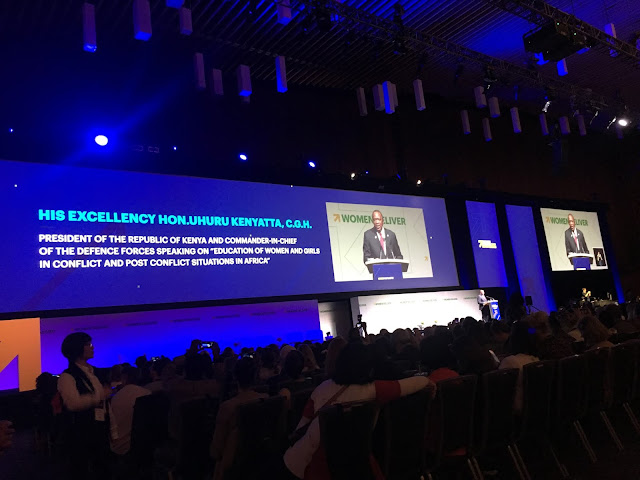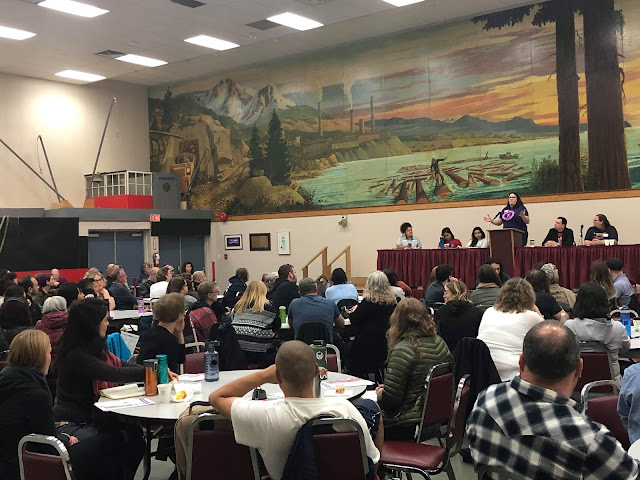Women Deliver: The Power of Integration and Scale
The Power of Integration and Scale: Driving Big Global Social Change
This plenary was opened by remarks from the President of the Republic of Kenya His Excellency Hon. Uhuru Kenyatta. Kenya is focusing their policies and legislation on women's rights. He said that good leadership is drawn from the aspirations of the population and it must include all in its population. There is an economic, political and moral imperative to centre women and girls in government policy. He ran through the list of things Kenya is doing:
- enact the first policy to that is focused on pre and post-natal care
- $480 million USD investment in maternity services and child immunizations
- reserve 30% of all government procurement for women, youth and the disabled (in the form of credit and training)
- moving towards the elimination of gender-based violence and female genital mutilation
- "gender mainstreaming" - to lift women out of poverty, improve illiteracy levels and cure diseases
- to stop abductions and forced marriages in the midst of crisis and conflict in the region
Then he went on to talk about the Nairobi Call to Action after the Education of Girls and Women in Conflict and Post-conflict Situations in Africa Conference earlier this year. It underscores the imperative on vulnerability, disruption and disempowerment that conflict causes for women and girls.
There are 11 points to the Nairobi Call to Action:
- Access to correct and current knowledge
- It urges women researchers and to ensure that a gender perspective that captures women and girls.
- address conflict response cycles
- Support teachers to have the skills to support students on a psychological level
- recruitment and deployment of mediators in peace settlements
- education and awareness for the eradication of gender -based violence by changing the culture
- unique interventions for children with disabilities
- grow international and pan-African strategy in gender mainstreaming
- re-entry policies to education for teenage mothers and pregnant girls
- vocational training
- establish and maintain safe zones that focus on holistic interventions (for example - ensuring that there is access to parenting skills training for young mothers
He is optimistic about this ambitious plan. The power of must deliver a more gender equal society. He has committed Kenya to do everything they can to end FGM by the close of his term in 2022. He wants to be sure that no one is left behind in his country.
That's a pretty good mandate from a national leader, eh?
Panel:
- Anne-Birgitte Albrectsen - Plan International
- Henrietta Fore - UNICEF
- Kristalina Georgieva - World Bank
- Dr. Githinji Gitahi - Amref Health Africa
- Alan Jope - Unilever
- Manasa Priya Vasudevan - The YP Foundation
- Gerda Verburg - SUN Movement
- Ntokozo Zakwe - DREAMS
- Marie Villeneauve - CBC, Radio Canada (moderator)
Kristalina Georgieva, the CEO of the World Bank was up first to talk a little of what is going on at the World Bank in terms of promoting gender equality. The World Bank is an organization that has programs in 120 countries around the world. They are making an effort to engage the Ministers of Finance and heads of states around the world in changing the language of economics to be more inclusive. The World Bank is engaged in applying a gender lens on the projects they finance. For example, In India, they funded a road and infrastructure for a train and want to know that women will be safe - so they added women only train cars. They are starting to fund projects that target women's issues - reproductive rights, education and women's access to credit and assets. At the end of the panel she did say outright that as a woman in a very senior role she knows she has a huge responsibility to deliver positive outcomes for women and girls around the world.
 I did not know that the World Bank was engaged in as many projects that centre women and girls - something that I am definitely interested in learning more.
I did not know that the World Bank was engaged in as many projects that centre women and girls - something that I am definitely interested in learning more.
Manasa Priya Vasudevan from the The YP Foundation, talked about scaling up interventions. That there needs to be a purposeful translation of intentionality. In many countries it's also spending time in trying to correct misinformation. I was very impressed by her - she is a young leader involved in an intersectional, feminist and rights based organization that supports the development of young leaders to advance the rights of women, girls and other marginalised youth.
Alan Jope, the CEO of Unilever talked the role of the private sector. For him, getting his own house in order is important. Their board consists of 6 men and 6 women and women make up 49% of management. They also have made changes to their value chain by employing small farms owned and operated by women.They are also working with their brands on unstereotyping in brand communication and marketing (just look at Dove's messaging that focuses on women's self-esteem).
Anna-Birgitte Albrectsen of Plan International was next. She's spent her life pushing governments to listen to women in a world where it is getting harder and harder to hold them to account. The SDG report is a powerful dream and promise but lacks an accountability framework. Constructive dialogue with governments to create space for youth to share their needs and dreams is needed or else the consequences will be dire. We need to spend time listening to the ones who need the policies we advocate for. How do we do this work without siloing ourselves? Without digging into nationalist tendencies?
Plan International centres the girl child in the heart of their work. They look at everything through the lens of the "girls' plan" where the 25 year plan sees woman who is a strong citizen where all of her potentials are fulfilled. She was a little critical of Trudeau - instead of praising him for the announcement, she asked the important question - what happens after these announcements? An investment framework must be employed to integrate intention with funding and evaluation. YES!
Henrietta Fore, the Executive Director of UNICEF talked a little about the digital divide that exists in girls' education around the world. So many schools do not have access to the internet - we need to create a world where all schools around the world are connected to each other. She then went on to challenge us to ensure that work-study, mentorship and job shadowing programs exist in all sectors in the world. At that point Stephanie Smith and I turned to each other and thought this would be a great idea for the labour movement to consider. She would bring it up at the Fed Officers table to start the discussion. My own union is in a weird time where our membership is majority women and yet our senior leadership still is dominated by men. In fact we are going backwards. By showing young women that there are leadership positions in the union and with folks like Stephanie at the helm of their organizations, it shows that it is possible for them to be in a position of leadership.
 Dr. Githinji Gitahi - Amref Health Africa, brought some humour and levity to the session. He started by saying that women's power is intimidating to men and then took us on the advocacy train. Communities drive what we do that there is a contract between the duty bearers and the rights bearers. Their organization's role is to activate the people to hold government to account. His closing remarks stuck with me - "equity is not equality when we speak about gender because equality is not fair!
Dr. Githinji Gitahi - Amref Health Africa, brought some humour and levity to the session. He started by saying that women's power is intimidating to men and then took us on the advocacy train. Communities drive what we do that there is a contract between the duty bearers and the rights bearers. Their organization's role is to activate the people to hold government to account. His closing remarks stuck with me - "equity is not equality when we speak about gender because equality is not fair!
Ntokozo Zakwe from DREAMS talked about an integrated approach to HIV/AIDS. They are an organziation that is made up of 10 sub-Saharan African countries to reduce the rate of HIV/AIDS among young women. They have made a concerted effort to include young girls from the beginning and developed a program based on the feedback from them. They took a holistic approach and centred the hopes and dreams of girls with the main goal of supporting them to live. Wow. That is sobering and another privilege check.
 Gerda Verburg from the Scaling Up Nutrition (SUN) Movement was quite funny. She talked about how growing up with 7 brothers taught her how to navigate the world. That as a girl she needed to be able to not be scared of stepping into her own power and to figure out how to get men to support women. Her parents were farmers and raised her brother and sisters the same and empowered them in the same ways. She encouraged us to use our talents and that the best results grow bottom up.
Gerda Verburg from the Scaling Up Nutrition (SUN) Movement was quite funny. She talked about how growing up with 7 brothers taught her how to navigate the world. That as a girl she needed to be able to not be scared of stepping into her own power and to figure out how to get men to support women. Her parents were farmers and raised her brother and sisters the same and empowered them in the same ways. She encouraged us to use our talents and that the best results grow bottom up.
The SUN movement is in 61 countries that focuses on the physical and cognitive development of children and to collectively end malnutrition. In many countries, boys are fed differently than girls and many politicians are not aware of the importance and the gendered imbalance of nutrition.
Like every other session I left with lots of questions and homework.




Comments
Post a Comment